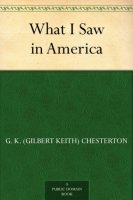 What I Saw In America by G. K. Chesterton (originally published 1922)
What I Saw In America by G. K. Chesterton (originally published 1922)
In 1921, G. K. Chesterton embarked on a lecture tour of the United States, and "everybody who goes to America for a short time is expected to write a book," so he did. This is no travelogue, however, but a set of serious essays inspired by Chesterton's observations.
It was only after graduating from college that I began to have an appreciation for the study of history. During my school years, the world was divided into "math/science people" and "English/history people." Being both good at math and an avid reader of science fiction, I was clearly one of the former. The reasoning behind this idea that one should not be good at, nor even interested in, all of the above escapes me as much as why I allowed myself to be so labelled.
While I would still choose reading and mathematics as of all the school subjects the most important for a child to master "early and often," I'd now put history a close third. I know of no other way to counter what C. S. Lewis called "chronological snobbery." It is far, far too easy for us to assume that progress only goes in one direction, that we have come "sooo far" from our predecessors socially as well as technologically. Reading history—especially writings that were current at the time—is the best way I know to understand that the people of the past were human beings like us rather than incomprehensible, unenlightened savages. To use an extreme example, it is easy to hate Adolph Hitler, almost as easy to revile the German people (and others) for not rebelling wholesale against the evil he brought on, and pathetically easy to assure ourselves that we would never let anything like that happen today. But never in all my schooling did I experience a serious attempt to understand historical events and situations as they were seen at the time by intelligent, thoughtful, normal people. We are appalled when Hitler speaks of the "Jewish problem," but don't make the effort to figure out what it was about the circumstances that made the Jews a particularly acceptable scapegoat. We're taught, as I was in school, that white southerners were evil to resist having their children bussed across town to attend black schools; I never had an appreciation for the many non-racially-motivated reasons not to place your child on that sacrificial altar until I spoke with someone who had lived through it. By no means do I subscribe to the theory that in the attacks of September 11, 2001 we "got what we deserved," but if we—or at least our policy analysts—had been in the habit of looking at ourselves and our actions through other eyes, we at least would not have been so surprised.
What I Saw in America is a great antidote. Chesterton is so insightful that it's easy to think of him as outside of his cultural and historical surroundings, but he was writing nearly a century ago. Think for a minute of what the world was like during his 1921 American tour. (Maybe you do this kind of thinking all the time, but it's new for me.) The Civil War was closer to 1921 than the Korean War to 2013. Arizona and New Mexico had only been states for nine years, and last of the Indian Wars were but a few years past. Prohibition was new. Harding was the newly-elected president. The Panama Canal was a mere seven years old. Chesterton's essays glow with the perspectives of both another culture (British) and another time.
I don't claim Chesterton is always easy to understand, especially for someone who knows little about America in that era, and who doesn't possess the everyday knowledge he expects to be common to his British audience. But he's always worth reading, nonetheless. Very thought-provoking, but alas, not further-post-provoking at this time. Life calls.


